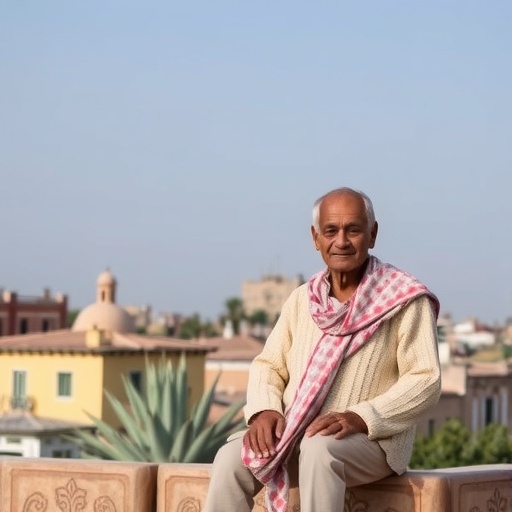The aging population globally presents unique challenges and opportunities, and recent research has illuminated vital aspects of this demographic, particularly in Morocco. A key study contributing to our understanding was conducted by Arif, Bouzid, Hami, and their colleagues, focusing on the profile and quality of life of older Moroccans. This scoping review not only highlights the myriad of factors impacting the well-being of this group but also calls attention to broader implications for healthcare policy and social support systems in a rapidly aging society.
The researchers embarked on an extensive investigation into the lifestyle, health conditions, and psychological well-being of older adults in Morocco. As populations age, it becomes increasingly important to gather comprehensive data that reflects the unique circumstances and challenges faced by these individuals. This study classified various determinants of quality of life, including socioeconomic status, health care accessibility, and cultural factors, weaving a complex picture of aging in Moroccan society.
In their findings, the authors underscored the pressing need for tailored healthcare services that cater specifically to the older demographic. Within Morocco, disparities often arise from urban-rural divides, which greatly affect access to essential medical resources and support networks. The researchers endeavored to bridge this gap by providing insights into how healthcare systems could be restructured to better serve older adults in both urban and rural settings.
Moreover, the quality of life for the elderly was closely examined through lenses of mental health, physical well-being, and social interaction. The study illustrated how social isolation, prevalent in some Moroccan communities, profoundly impacted the mental health of older adults. This revelation urges policymakers to consider interventions that foster community connectivity and improve social structures to enhance mental well-being among the elderly.
Physical health emerged as a crucial aspect of the quality of life for seniors, with chronic diseases such as diabetes and hypertension identified as significant concerns. The researchers found that many older Moroccans often face barriers to accessing preventive care and management resources, resulting in a cascade of health complications. Addressing these deficiencies in health services could dramatically influence not only the longevity but the quality of life for older adults.
Furthermore, the review highlighted how cultural expectations and norms shape the treatment of elderly individuals within families and communities. In Moroccan culture, respect for elders is paramount, yet the realities of modern society often result in a disconnection between traditional values and contemporary living circumstances. This disconnect can lead to neglect or inadequate support systems for older individuals, requiring a societal shift in the perception and treatment of aging populations.
The researchers encountered varying perceptions of aging across different Moroccan communities, which influenced the overall experience of older adults. In more egalitarian societies, there was a greater emphasis on providing care and support for the elderly, contrasting with areas where economic hardship prevailed, leading to neglect. Understanding these cultural nuances is vital for developing effective interventions aimed at improving the quality of life for the aging population.
As the Moroccan government and healthcare stakeholders strategize on policies for aging populations, this research provides foundational insights that can guide decision-making processes. It emphasizes the importance of creating an environment where older adults feel valued and supported, enabling them to lead fulfilling lives despite the challenges of aging.
Continuing this dialogue around aging in Morocco not only aims to elevate the quality of life among older citizens but also to prepare society for the demographic shifts that are inevitable. The acknowledgement of the contributions that elder citizens provide is essential; thus, the research serves as a catalyst for further exploration and activism in the field of gerontology.
In conclusion, the scoping review by Arif and colleagues stands as a significant effort to comprehend the complexities of aging within Moroccan society. It presents a thorough analysis of factors impacting older adults and proposes key avenues for improving quality of life. Addressing the highlighted disparities and implementation of tailored healthcare policies can indeed transform the experiences of older Moroccans.
The necessity of continuing to refine and address the concerns of older adults through research cannot be overstated, as this demographic is integral to the fabric of society. As more studies akin to this emerge from different contexts, they will help inform best practices and policies that resonate with the specific needs of aging populations worldwide.
Ultimately, the discourse surrounding the elderly should not conclude here but rather should persist, weaving in the voices and experiences of older adults themselves, to enhance their role and recognition within both family structures and society at large.
By prioritizing the increasing depth of knowledge about the aging population in Morocco, researchers like Arif, Bouzid, and Hami contribute significantly to forming a future where older adults are empowered, engaged, and embraced by their communities.
In this light, the study paves the way for further inquiry into not only the Moroccan context but also how findings can be extrapolated to benefit similar demographics in different regions grappling with aging.
Through concerted efforts, the health and social systems can evolve to better support the needs of older Moroccans, ensuring that they can lead dignified, fruitful lives well into their later years.
Subject of Research:
Quality of life of older Moroccan population and associated factors.
Article Title:
Profile and quality of life of the older Moroccan population: a scoping review of associated factors.
Article References:
Arif, R., Bouzid, J., Hami, H. et al. Profile and quality of life of the older Moroccan population: a scoping review of associated factors.
BMC Geriatr (2025). https://doi.org/10.1186/s12877-025-06666-2
Image Credits: AI Generated
DOI:
Keywords: Aging, Quality of Life, Older Adults, Morocco, Healthcare, Social Factors




